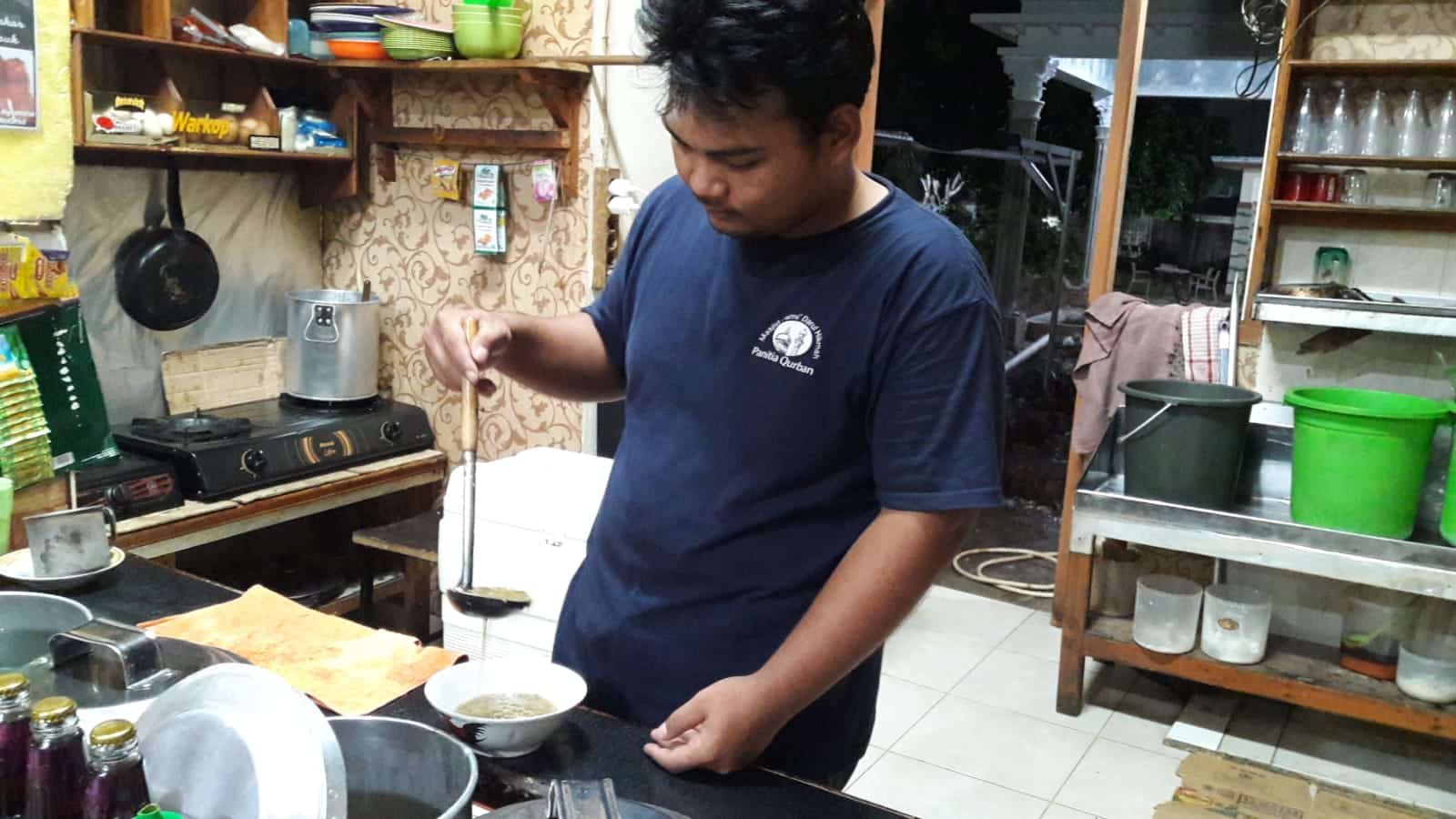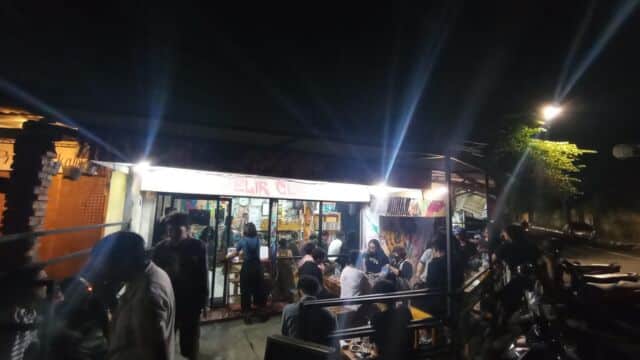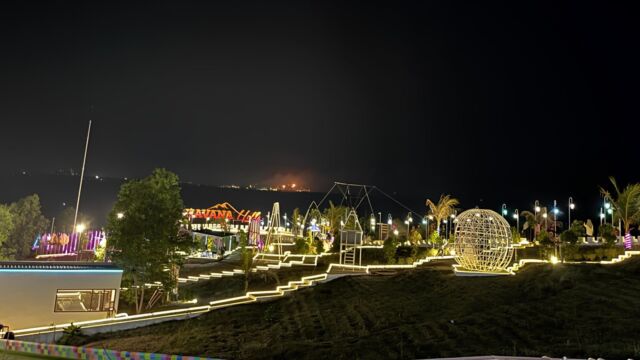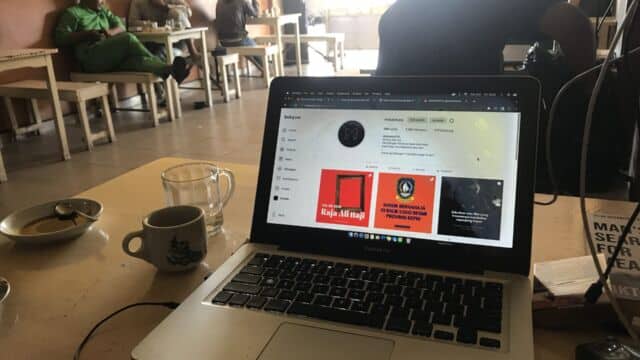When I’m Restless at One A.M., This is the Place I Go
Photo: Ferry Firdaus
A burjo resto | 2,500 words | Translated from Bahasa Indonesia by Sarah Leys
Ultimately, what Aa Burjo is selling here is conviviality, observes my friend Tedi, after we polish off two bowls of delicious instant noodles complete with runny fried eggs. He is, at least this time, spot on. The food here, whether the mainstay dish of bubur kacang ijo, a sweet porridge with mung beans and coconut milk, or the other advertised dishes, is easy enough to cook up. Yet droves of people stop in at this burjo resto on the roadside, because the most popular thing on the menu here is conversation.
‘Burjo’ is an abbreviation of bubur kacang ijo. The person who tends a burjo resto, usually an older man, tends to be nicknamed ‘Aa Burjo’, Aa meaning older brother in the Sundanese language. Often if not always, the people who tend burjo restos in Indonesia originate from the Cirebon or Kuningan districts of West Java. In Indonesia, professions not infrequently become associated with particular ethnicities: the Batak people are associated with lawyers, the Madurese with running convenience stores. It’s not always so, but in some cases, like the burjo restos, there really is a strong correlation.
In general, burjo restos are narrow, stuffy spaces. And they’re always decked out in an identical style. Perhaps there’s a formal standard that must be applied by all burjo resto owners in the Indonesian nation, I don’t know. But they all look, more or less, like this:
A long counter forms a letter ‘L’ shape, and can accommodate at most 10 people. Upon sitting down, we face a bunch of spicy soy sauce bottles, placed untidily. Soft drinks, sugary-sweet to a level that is inhumane, are served in bottles, and can be seen side-by side on the counter-top with gorengan, fried snacks, and krupuk prawn crackers in big tins. There are also tissues – usually toilet paper, actually, which Indonesians frequently misuse as napkins. Behind the counter, on Aa Burjo’s side, are the stoves, upon which sit large pots to cook the instant noodles and keep warm the bubur kacang ijo.
I’m amazed by the creativity at work in these places to maximise space. Shelves are affixed to the walls: it’s there that the noodle packets are stored. A fan, radio, and television are also affixed to the walls high up in the room’s corners, and each emit much the same level of noise. Cables, and long strips of satchels containing instant coffee and condensed milk, hang down from the ceiling, sometimes buffeted gently by a breeze from outside. The menu – printed with a low quality, just some A4 sheets laminated so much they’re gleaming – has been airily glued to the wall. If the resto owner is a little religious, there’ll be some Arabic writing on the wall as well, though more often there’s only the stickers that are given out at elections and feature the faces of politicians, which are wrinkled.
Now, at 1:30 A.M., we’re sitting at the L-shaped counter, on benches without backs, face-to-face with the baskets of fried snacks that are getting cold and the spicy soy sauce bottles placed haphazardly. I gaze over to the resto entrance for a minute, which opens directly onto a road filled with buses going in the direction of Rangkas Bintang. Everything around me is getting dark and shadowy, and out on the road dust is flying, blown about by a high wind. Turning my gaze to the left-hand corner of the wall above me, I see the TV broadcasting some middle-of-the-night news, featuring a stony-faced presenter. Always stony-faced.
A police officer has killed another police officer. Somebody corrupt has secured early release from the sentence they ought to have served. A comedian has been arrested for possession of drugs. A religious leader has been molesting his students. The price of fuel is rising. Bad news is followed by more bad news. And because we have too often heard stories similar to these stories, we are no longer surprised.
‘You didn’t join the demonstration about petrol prices going up?’ asks Aa Burjo, without turning to face us. He’s busy drying bowls with a black-and-white chequered dishcloth. His hands move rapidly, expertly.
‘Nope, couldn’t be bothered’, I answer, shaking my head. I then add – to give a reason, before he can ask further – ‘the weather these last few days must be what the weather in hell is like’.
‘He doesn’t believe in rallies anymore’, says Tedi, while chuckling. ‘He thinks it’s all BS. The government only cares about things that go viral on social media. Demonstrations are just a tool for activists to use before they join political parties’.
I jab Tedi with my left elbow. I’ve never thought anything remotely like that. What Tedi has just stated is his own opinion. He’s often said it, ever since he first entered college.
‘Oh, like that activist from 1998, right’, says Aa Burjo. ‘What’s his name – is it Budiman Sudjatmiko?’
Tedi and I look at each other for a second, then smile: this discussion is familiar to us.
‘I often hear that name tossed around by college students’, Aa Burjo says. He’s still busy with plates and bowls. His head, with his hair receding at the front, gleams because of a lamp immediately above him.
‘Is their tone positive or negative?’ asks Tedi, his face expressing genuine curiosity.
‘Both. Depends what political party symbol they’ve got on their shirts’.
Tedi laughs. His stomach, only just filled up with instant noodles, shakes, and he slaps his knee, a routine tic of his, present ever since I first got to know him. I pity a little Tedi’s sense of humour. But Tedi always laughs: Tedi laughs at every opportunity. Maybe in this case he laughs from a sense of hopelessness at those ‘senior activists’ who become campus politicians as a shortcut to political power, then finally become corrupt as well. Tedi finds this amusing, hypocritical, and stupid all at once. What can we do about this sort of thing, except laugh?
Aa Burjo and I laugh as well, but not as loudly or protractedly as Tedi. My friend only stops laughing when a motorbike taxi driver working for one of the ride-hail apps, wearing the green jacket of their uniform, comes into the burjo resto. He looks a little younger than us, slim, and visibly exhausted. This makes me reluctant to try to communicate with him. Sometimes we can’t quite tell whether someone’s having a bad day or a good day: refraining from inviting those people to talk can be the safer choice.
‘The usual’, says the driver to Aa Burjo after he sits down beside us.
“We’re out of black sticky rice’, Aa Burjo says, without even needing to check the large pots.
‘Just a bubur kacang ijo then. And two slices of bread’.
‘Yes, sir!’ Aa Burjo raises a crisp salute, emulating our patriotic military.
It’s obvious that the driver who’s just arrived is a regular and that he and Aa Burjo know each other well. While Tedi and I are new to this resto. We’re hardly feeling awkward, but we’re of course not yet totally open, either.
I visit burjo restos about two or three times a month, if I’m suffering from an acute feeling of restlessness late at night, or a hunger that demands satisfying. I often help Tedi out with his final college assignments in his rented kost lodgings near Sultan Ageng Tirtayasa University, next to the bus and angkot minibus terminal of Pakupatan. This burjo resto is about 100 metres away from that terminal, and about a three-minute motorbike ride from Tedi’s kost. Earlier, we’d found ourselves famished. So here we are, sitting and waiting for the food we’ve eaten to be digested in our stomachs – or, to use more straightforward language, lazing around.
I take a cigarette out of my pack. The best way to enjoy being lazy is to smoke: I’ve been sure of that since high-school. A belief that can’t feasibly be shared with most people: a belief that often makes my mother in the kampung mad. A bad habit, so it’s said.
‘Lighter’s over there’, says Aa Burjo and points, having observed from me the signs that I want to smoke. He’s just finished serving up the driver’s order. An aroma of warm porridge wafts into the air.
I move to the place he has pointed out. A lighter is fastened by a piece of string hanging from a calendar on the wall. I need to use it while standing there.
‘Why is it tied up?’ I say, to make conversation. ‘Are you scared I’ll steal it?’
‘You ever been to the bank?’
‘Of course’.
‘Even banks, storing all that money, fasten their pens to their desks with string. You think we poor people can be more cavalier?’
Tedi, once again, laughs out loud. While I only give a grin.
I sit down again, attempting to quell a feeling of embarrassment. Then I smoke slowly. I blow lots of smoke rings, like a little kid.
‘The bank always mistrusts us, their own customers. Even though we hand our money over to them’, Tedi says, attempting to prolong this conversation. ‘Asking our mother’s maiden name and our most-recent transaction whenever we lose an ATM card’.
‘Yeah, it’s overkill I feel’, Aa Burjo responds. ‘But you know, as a basic matter of principle, no bank can be trusted. Especially Bank Toyib.’

Tedi, with his weird sense of humour, laughs wildly at this. It’s a very old joke, but one that gets repeated and repeated in Indonesia, especially by old men – a classic ‘Dad joke’. It’s playing on the name of a legendary figure named Bang Toyib who appears in the lyrics of dangdut songs, a character who refuses to take responsibility and has no compunction about impoverishing his wife and children. I laugh only a little, solely to appreciate the effort that’s involved in communicating a witticism. While the motorbike taxi driver, who has been eating his meal, is not even slightly moved.
Right at this time, I become aware: the first rule of tending a burjo resto is that you must have above-average communication skills. If you’re shy or quiet, becoming an Aa Burjo is not the right career choice for you. The job is a matter of doing a little joking around, so that your patrons don’t get bored, but not indulging in so much causticness that you irritate them. And it’s a matter of not only talking, but being skilled at listening. Plus understanding each customer’s particular situation. Aa Burjo is using humour with the two of us – and Tedi is visibly enjoying himself. But to the motorbike taxi driver he is only saying what is absolutely necessary, aware of that customer’s fatigue. Any Aa Burjo has to be intimately aware of conditions on the field.
But I’ll wager that 99% of Aa Burjo’s behaviour with us is not put on at all. Generally, Sundanese people have in them a knack for comedy. Sunda has contributed a very useful word to Bahasa Indonesia, ‘bodor’, which means a comedian or someone endeavouring to be funny. The Sundanese have supplied a lot of legendary comedians, like Kang Ibing or more recently, Sule.
In this small resto of his, Aa Burjo and his customers don’t have much distance between them. We interact, and our conversations – spontaneous, sometimes random – slide around every which way. It’d be pretty awkward after all if at such close quarters, with people’s eyes meeting constantly, we were to sit in a protracted silence the whole time.
Imagine: Aa Burjo has been performing such a routine for years, almost without days off, without rest. Meeting lots of people, of all ages and professions, men and women (though women typically come in during the day rather than at night), different people drawn by the servings of super-spicy food. Aa Burjo likely knows the secrets of a quarter of this city’s population. With his ability to both talk himself, and to convey empathy by listening, most every customer, let alone his regulars, will for sure open up and tell him their stories.
When my cigarette is almost down to its filter, an older man, whom I suspect works as an assistant on a bus – the person who arranges luggage and handles tickets – comes in holding a chessboard. The footfalls made by his green sandals on the floor, apparently too large for his feet, and slightly wet, are loud, his entrance bringing with it a ‘cit, cit, cit’. Killing time before his bus’s scheduled departure it seems.
‘Let’s play again, Aa’, the man says, and places the black-and-white board on the counter-top.
‘You order something first, before you settle down to play’, says Aa Burjo.
‘Two glasses of black coffee. It’s my shout this time. Don’t worry, I won’t ask you to put it on my tab’.
‘Yes, sir!’ Once again Aa Burjo emulates the military gesture. ‘I’ll make you a glass of coffee, you put the board together’.
Having come to an agreement, the two of them begin to go about their respective tasks.
The assistant bus driver, much of his hair already grey, arranges the chess pieces. White on the white side, black on the black. A moment after he’s done, in a voice that’s quite high-pitched, he begins to complain: ‘gas is up, the price of bus tickets has to go up as well, and so our customer numbers are going down. This damned government. If things are going to go on and on like this, when can I get married?’
‘How can you get married if you’re always drunk at work, though?’ Aa Burjo gives this rejoinder with a voice whose tone has also become relatively high-pitched.
‘I said I was car-sick, Aa’, says the man, ‘not drunk’.
Yet more puns: in Bahasa Indonesia, carsickness and drunkenness can share a word, ‘mabuk’. Tedi is going to some effort to restrain his laughter, covering his mouth with his hand. This friend of mine, so quick to laugh, now seems to have gone a little shy. I guess because he doesn’t really know the men next to him. He is usually able to eavesdrop on nearby humorous conversations with great ease. I’ve known Tedi since high-school: I know he is actually quite withdrawn. Sometimes I think that the reason he laughs so easily is because of his respect for the people he engages with.
So this is how it is: in the burjo resto we’re free to hear the complaints and unrestrained talk of everyone else. There’s no furtive whispering in here. Everyone can speak, and everyone can listen. Burjo restos are the most ideal of spaces for a democracy – perhaps that sounds overly utopian these days. And the jokes of Aa Burjo, both the genuinely funny ones and the lame ones, help to make people feel relaxed in here.

When the two glasses of coffee are served, I see that the board’s black king has been replaced by a soft drink bottle-top. A slight improvisation, one that requires some strength of imagination.
‘Exactly like in Indonesia’, says Aa Burjo, as he moves a black pawn.
‘Huh?’
‘The king can get replaced – it doesn’t matter whether it’s with a bottle-top or a sweet potato – and it makes no difference at all. The king is not actually very useful’.
Everybody laughs. This time, I also laugh heartily. The joke is bitter, but honest.
The one who laughs loudest is, of course, Tedi – here, again, is that slapping of the knee. The motorbike taxi driver who’s just finished his dinner, who beforehand hadn’t cared a whit for anything, also laughs. The weather’s now cool, but our conversation is giving a feeling of warmth.
I look at the time on my phone. Three A.M. We should go home. Tedi pays for our order – it’s his shout this time. 25,000 rupiah for everything – $2. Aa Burjo, who must briefly stop his chess game, says goodbye with great affability: ‘Don’t forget to stop by again sometime’.
I don’t know if I’ll be back or not. There are dozens of burjo restos in the city of Serang that I’m yet to try. But I agree with what Tedi says: at burjo restos, the most popular thing on the menu is conversation.
© Muhammad Nanda Fauzan
English translation © Sarah Leys






